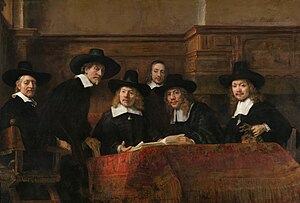Syndics of the Drapers' Guild
You can help expand this article with text translated from the corresponding article in Dutch. (July 2020) Click [show] for important translation instructions.
|
| The Sampling Officials | |
|---|---|
| Dutch: De Staalmeesters | |
 | |
| Artist | Rembrandt |
| Year | 1662 |
| Medium | Oil on canvas |
| Movement | Baroque painting, Dutch Golden Age painting |
| Dimensions | 191.5 cm × 279 cm (75.4 in × 110 in) |
| Location | Rijksmuseum, Amsterdam |
The Sampling Officials (Template:Lang-nl), also called Syndics of the Drapers’ Guild (Template:Lang-nl), is a 1662 oil painting by Rembrandt. It is now in the Rijksmuseum in Amsterdam.[1] It has been described as his "last great collective portrait".[2]
The men (with the exception of Bel who is an attendant as indicated by his calotte) are drapers who were elected to assess the quality of cloth that weavers offered for sale to members of their guild. Their one-year terms in office began on Good Friday and they were expected to conduct their inspections thrice weekly. The Dutch word staal means 'sample' and refers to the samples of cloth that were assessed. The inspectors used pliers to press the seals of their city (front) and guild (reverse) into penny-sized slugs of lead that were specially affixed to record the results of the inspection.[3] There were four grades of quality, the highest was indicated by pressing four seals and the lowest by pressing only one.
The men, who are appraising a length of Persian-style fabric against exemplars from a swatch book, are (from left to right):
- Jacob van Loon (1595–1674)
- Volckert Jansz (1605 or 1610–1681)
- Willem van Doeyenburg (ca. 1616–1687)
- Frans Hendricksz Bel (1629–1701)
- Aernout van der Mye (ca.1625–1681)
- Jochem de Neve (1629–1681)
The guild commissioned this portrait and it hung in their guildhall, the Staalhof (nl), until 1771.
The painting is used on the packaging of Dutch Masters cigars. The painting is also seen on the wall in H. G. Wells' house in the opening sequence of The Time Machine. The painting has a prominent part in Jeffrey Archer's 2019 book "Nothing Ventured". It is used on the cover of the book titled 'The Company: A Short History of a Revolutionary Idea' by John Micklethwait and Adrian Wooldridge.[4]
See also
References
- ^ [1]. Rijksmuseum Amsterdam. Retrieved on 2008-05-03.
- ^ The Worldwide Art Gallery. "Rembrandt Harmenszoon van Rijn (1606 - 1669)". Theartgallery.com.au. Retrieved 2014-04-08.
- ^ Juran, Joseph M., ed. (1995), A History of Managing for Quality: The Evolution, Trends, and Future Directions of Managing for Quality, Milwaukee, Wisconsin: The American Society for Quality Control, p. 229, ISBN 9780873893411, OCLC 32394752
- ^ Micklethwait, John; Wooldridge, Adrian (11 January 2005). The Company: A Short History of a Revolutionary Idea. Random House Publishing. ISBN 9780812972870.
External links
- The Sampling Officials at the Rijksmuseum Amsterdam
- Jacob van Loon biography (in Dutch)
- Volckert Jansz biography (in Dutch)
- Willem van Doeyenburg biography (in Dutch)
- Frans Hendricksz Bel biography (in Dutch)
- Aernout van der Mye biography (in Dutch)
- Jochem de Neve biography (in Dutch)
- Wolfgang Kosack "A second Rembrandt"
